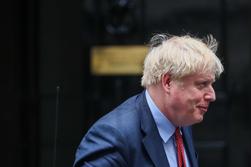 In this July 8, 2020 file photo, UK Prime Minister Boris Johnson departs from Number 10 Downing Street to attend a weekly questions and answers session in Parliament in London, UK. (PHOTO / BLOOMBERG)
In this July 8, 2020 file photo, UK Prime Minister Boris Johnson departs from Number 10 Downing Street to attend a weekly questions and answers session in Parliament in London, UK. (PHOTO / BLOOMBERG)
Prime Minister Boris Johnson will put his plan to break international law over Brexit to its first debate and vote in the UK Parliament on Monday, amid a growing rebellion from his MPs and further criticism from former premiers and European Union leaders.
Johnson is likely to get the Internal Market Bill, which would allow the UK to unilaterally override parts of the divorce treaty it signed with the EU, over its first hurdle in the House of Commons, though bigger rebellions are expected in later stages when MPs vote on proposals to rewrite the most controversial parts of the legislation. The EU has threatened legal action unless Johnson backs down by the end of the month, a request his government has rejected.
Former prime ministers John Major and Tony Blair wrote a joint opinion piece in the Sunday Times that Johnson’s plan is “shocking” and imperils the Good Friday accord that led to more than two decades of peace in Northern Ireland
The risk for Britain is that the controversy around Johnson’s plan increases the prospect of ending the Brexit transition period without a free trade accord with the EU, causing an economic shock as tariffs and quotas are introduced on commerce with its biggest trading partner. The bloc has accused the UK government of undermining trust and reneging on an international treaty.
ALSO READ: Brexit trade talks deadlocked, to continue in Brussels
Yet Johnson’s immediate challenge is to marshal his Conservative MPs into supporting him and see off a revolt from his own lawmakers who are seeking to amend the bill.
'Good chance'
Bob Neill, the Tory MP who has sponsored a rebel amendment to the Internal Market Bill that would bar the government from overriding the Brexit Withdrawal Agreement without parliamentary support, told Bloomberg Radio on Monday it has got “a good chance” of passing.
“We’ve got significant and growing support for it because I think it’s a sensible compromise,” he said. “It’s reasonable for the government to play hardball, but within the rules,” he said, adding “don’t come down to the level of breaking your international commitments.”
In a sign that the rebellion is growing, Johnson’s former attorney general, Geoffrey Cox, accused Johnson in the Times of doing “unconscionable” damage to Britain’s international reputation. More than a dozen Conservative MPs had been waiting for Cox’s opinion before deciding whether to back the bill, the newspaper reported.
ALSO READ: Breaking Brexit treaty? Britain unveils details for post-EU life
Former prime ministers John Major and Tony Blair wrote a joint opinion piece in the Sunday Times that Johnson’s plan is “shocking” and imperils the Good Friday accord that led to more than two decades of peace in Northern Ireland.
Last resort
David Cameron added his name to the list of former British leaders urging caution on Monday, telling a TV crew he has “misgivings” about what the government is proposing.
“Passing an act of parliament and then going on to break an international treaty obligation is the very, very last thing you should contemplate,” he said. “It should be an absolute final resort.”
In Johnson’s own Cabinet, Justice Secretary Robert Buckland told the BBC he would resign if the rule of law were broken in an “unacceptable” way. The main opposition Labour Party also said it will vote against Johnson’s proposals as they currently stand.
Still, with a majority in the Commons of 80, it looks like Johnson will have enough votes to proceed with his plan.
Credibility
EU leaders continued to express their concerns about the UK’s actions. Council President Charles Michel said Britain’s international credibility is at stake, while Michel Barnier, the EU’s chief Brexit negotiator, rejected theUK’s claim that the divorce treaty is a “threat to the integrity of the UK.”
“We agreed this delicate compromise with @BorisJohnson & his gov in order to protect peace & stability on island of Ireland,” Barnier tweeted.
Barnier and UK Brexit negotiator David Frost had a public Twitter spat on Sunday over the question of Northern Ireland, and whether the EU had threatened to block food imports from Britain into the province during the trade talks. Barnier said the bloc wasn’t refusing to allow them, whereas Frost said the threat had been made.
READ MORE: EU preps for 'no-deal' Brexit as UK refuses to blink in stalemate
The government stuck to that argument on Monday, with Policing Minister Kit Malthouse telling BBC radio that Johnson’s legislation is necessary to allow food to continue to pass from Great Britain to Northern Ireland.
“If we get to a situation where we’re not recognized as a third country and it therefore becomes illegal to move food to Northern Ireland, what is a UK prime minister supposed to do?” Malthouse said. “Northern Ireland is unequivocally part of the UK customs territory, so that fact that that is now being brought into question is a very difficult situation for us to face.”


